
Super-Gods: The Greatest Mythology in Comics
 This week sees the release of Michael Avon Oeming's "God Complex," a comic about a man named Paul who is actually the Greek god Apollo, trying to live a normal mortal life despite his divine family's best efforts at persuading him -- which, as this is comics, means trying to kill him.
This week sees the release of Michael Avon Oeming's "God Complex," a comic about a man named Paul who is actually the Greek god Apollo, trying to live a normal mortal life despite his divine family's best efforts at persuading him -- which, as this is comics, means trying to kill him.
Not only does "God Complex" sound like a lot of fun, but it's gotten us thinking about other uses of mythology in comics. After all, with their emphasis on super-powered figures taking an active role in the lives of mortal men, super-hero books are often looked as the modern equivalent to the myths and legends of centuries ago, and as a result, comics are carrying on the tradition to the point where there's more gods in Marvel Comics than in an Edith Hamilton book! So today, we've summoned ComicsAlliance's very own Oracle of Delphi, Chris Sims, to shed some light on some of the best uses of classic mythology in comics!

Marvel's Mighty Thor
What with the fact that his entire deal is throwing around lightning while bashing villains' heads in with his magic hammer, the Norse god Thor would seem like a modern super-hero even if Stan Lee and Jack Kirby hadn't made him one of the core characters of the Marvel Universe. It was writer/artist Walt Simonson, however, who perfected an expert blend of Norse myth and the Marvel Universe, a combination that allowed Thor to do stuff like battling a mad fire giant alongside a cosmically-powered cyborg horse from space.
It's important to note, though, that characters like Volstagg were created exclusively for the comics, which we think is a definite improvement.

"Thor" isn't just responsible for bringing Norse mythology to the Marvel universe; Roy Thomas used the "Eternals Saga" to tie Thor to Germanic hero Siegfried, and Stan and Jack themselves used the Thunder God's "Journey Into Mystery Annual" #1 to start up the ultimate "who would win in a fight" rivalry by pitting Thor against Hercules in their first of many battles. Herc went on to be a long-standing member of the Avengers, bringing along his half-brother Ares, who was a long-standing villain before starring in his own miniseries where the Greek gods battled against the Japanese god Mikaboshi, then landing in "Dark Avengers."
Herc himself is currently enjoying a solo title, "The Incredible Hercules," that follows the Simonson mold with constant references to the classic myths...
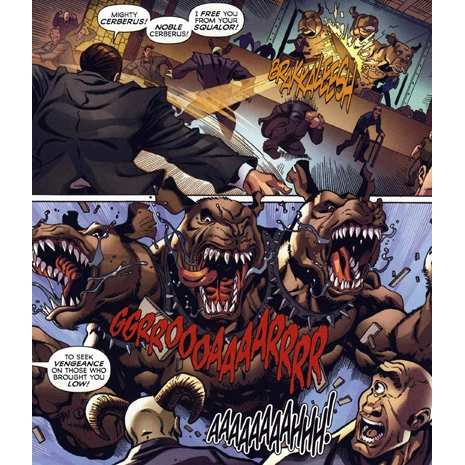
...like a scene where he freed Cereberus -- the three-headed guard-dog of the underworld -- whom he had previously chained up as his twelfth labor.
Writers Greg Pak and Fred Van Lente even used the book as a springboard to bring in other myths with the "Secret Invasion" crossover...

...introducing a whole host of gods and tying them into Marvel characters like Snowbird and Ajak of the Eternals.
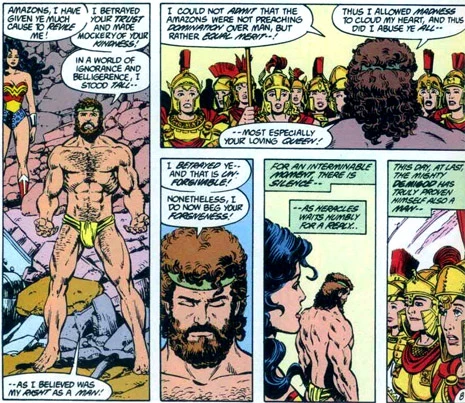
Wonder Woman
Hercules fared slightly worse (and sported slightly smaller pants) in Wonder Woman, where his famous battle with the Amazons and Queen Hippolyta -- given a more lighthearted and comedic spin for Marvel's heroic version -- was treated closer to its literal roots.
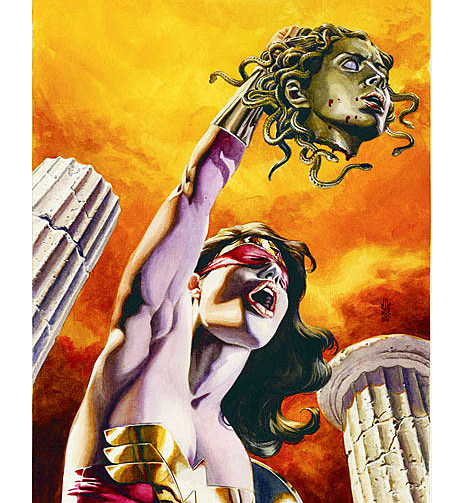
As for Wonder Woman herself, the 1987 reboot of the character by writer/artist George Perez tied her closer to Greek mythology, firmly cementing her powers as coming from the gods and -- like Hercules -- giving her Ares and other mythological figures (like the Medusa seen above) as frequent sparring partners.
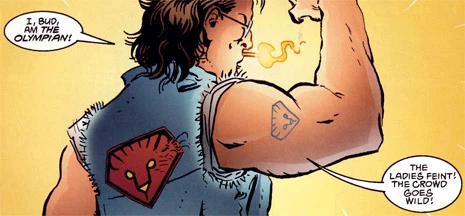
Mage's Kirby Hero

The Sandman
Given that "Sandman" itself is a story about the nature of stories, it should come as no surprise that writer Neil Gaiman drew upon the stories that form the basis of western literature. The title character is even referred to as "Morpheus" on several occasions, referencing the Greek god of dreams rather than the guy from "The Matrix."
It's interesting to note that Gaiman included heavy references to both the story of Orpheus and Eurydice -- both directly and with Dream's own trip to the underworld in "Season of Mists," which features other mythological characters -- and to Shakespeare's "A Midsummer Night's Dream," which itself draws heavily on mythology itself.
And now you know what you can write your Freshman English paper about.
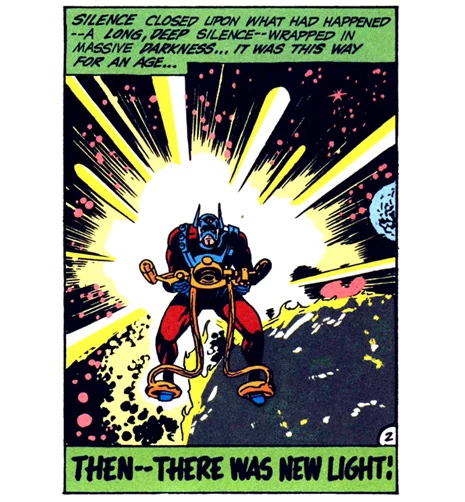
If you look closely at the first few pages of "New Gods" #1, you can see a few of Thor's artifacts poking out of the rubble of the "Old Gods," which is just one of the signs that Jack Kirby -- who had recently left Marvel, where he did stories about gods other people had created so that he could create some of his own -- was in the mood to do something different. He still drew on the classic myths for inspiration, though, both in his Fourth World saga -- whose lead character was modeled after Orion the Hunter -- and in the later "Eternals," which featured Ikaris.
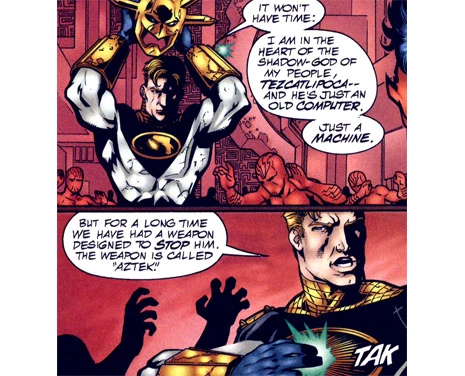
Grant Morrison's Aztek
One of our favorite myth-based characters -- and easily one of the most underrated characters of all time -- is Aztek, created by Grant Morrison and Mark Millar as one of the bright spots of the mid-90s super-hero scene. Rather than drawing on Western mythology, Aztek was raised as an agent of the Mesoamerican god Quetzalcoatl, part of a legacy tasked with protecting the world from the return of Tezcatlipoca, a god with the utterly badass nicknames "Enemy of Both Sides" and "Smoking Mirror."
Of course, this being a Grant Morrison creation, Tezcatlipoca was later revealed to be Mageddon, the sentient "techno-active" anti-sun from beyond the edge of time.
Because comics. That's why.
More From ComicsAlliance
![Natalie Andrewson Illustrates Powerful Folktales From Around The World [Art]](http://townsquare.media/site/622/files/2013/08/a-rose-for-emily_natalie.jpg?w=980&q=75)

![Jesse Tise Draws The Gods Of Astronauts And Aliens [Art]](http://townsquare.media/site/622/files/2012/08/36euphoria.jpeg?w=980&q=75)






